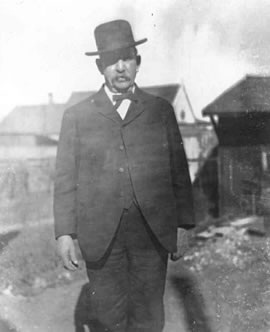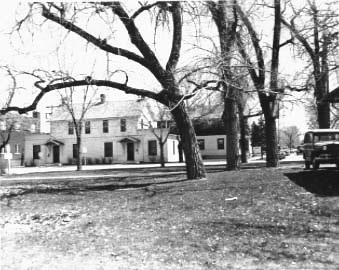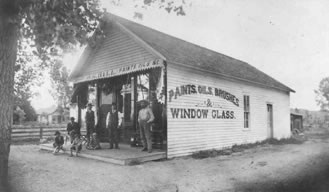Hill Family

Mr. Julius D. Hill, c.1910.
Julius D. Hill, known as J.D. Hill, was born in Massachusetts in 1843. He joined the Union Army at age 18, serving as corporal with Company H of the 25th Massachusetts Infantry for four years.
Hill arrived in Denver in 1866 and took a job cutting 150 tons of hay along the Platte River near Fort Lupton. He then took odd jobs around Denver until he worked on the Union Pacific and Central Pacific railroads. Hill came to Littleton in 1870 and was employed by the Rough and Ready Flourmill. In 1872 he chose a site on Rapp Street and erected a large two-story white frame building just south of the Masonic Temple. Though Littleton had a few smaller stores, the J.D. Hill General Store carried everything, including hay, coal, shoes, groceries and dry goods. In 1964, Ed Bemis recalled that Mr. Hill attracted customers to his store by providing free ice water on tap. "In the summer I used to ride my bicycle around the store and get so hot that I had to quench my thirst with that ice water. I did this so often that Mr. Hill said it was bad for me to drink ice water when I was so heated up. I have since concluded that he didn't want me drinking up all his ice water".

Littleton's first general store, the Julius D. Hill General Store, 5728-38 S. Rapp Street. The building was built in 1872. The four cottonwood trees in the foreground were part of a circle of trees inside the fence of a circular plaza in front of the old Harwood Inn.
The second post office in Littleton was located in Hill's store and remained there for about 25 years. Mr. Hill served as postmaster in the 1890s. Many important events having to do with Littleton's early history seem to have centered on the store. The Weston Masonic Lodge was started in the hall above the store in 1872. The hall was also the meeting place of the Catholic, Methodist and Christian Science churches as well as the Odd Fellows Lodge. After the town was incorporated in 1890, the first council meeting was held in the hall. J.D. Hill served on that first council and again in 1895-1896.
In 1876, Hill married Inez Berry, daughter of Benjamin J. Berry, another old-timer who has a Littleton street named for him. The Hills had one daughter, named Eva, who married Mel Edwards.

Littleton's first drug store, c.1885-1890, located on the present-day site of the Masonic Hall at 5718 South Rapp St. Standing, left to right: Oscar G. Hill, druggist and owner; Julius D. Hill, John B. Mayers.
In 1884, with I.S. Morse, Hill built the Littleton Creamery on Alamo Street, just around the corner from the general store. J.D. Hill's first home was on the north side of Main Street, near the present location of Bradford's Auto Body Shop. After he built the creamery, Hill erected a home at 2645 W. Alamo Ave., now the parking lot of the Elks Lodge.
O.G. (Oscar) Hill, J.D.'s brother, built Littleton's first drug store, the O.G. Drug Store, on the site of the Masonic Temple. The store was later moved to Main Street.
Hill was one of the organizers, vice president and director of the First National Bank in Littleton that closed during the depression.
J.D. Hill died on December 24, 1915 and Inez died in 1919. They are buried in the Littleton Cemetery.
Bibliography
Littleton, (Colo.) Independent. Littleton, Colo.: Littleton Independent Publishers, 1888-
Littleton Museum. Photographic Archives and Biography/Place Name Files.
_____. Vertical File: "Hill Family."
Photographs courtesy of the Littleton Museum unless otherwise noted. To order copies, contact the museum at 303-795-3950.
Compiled by Lorena Donohue
Updated March 2021 by Phyllis Larison